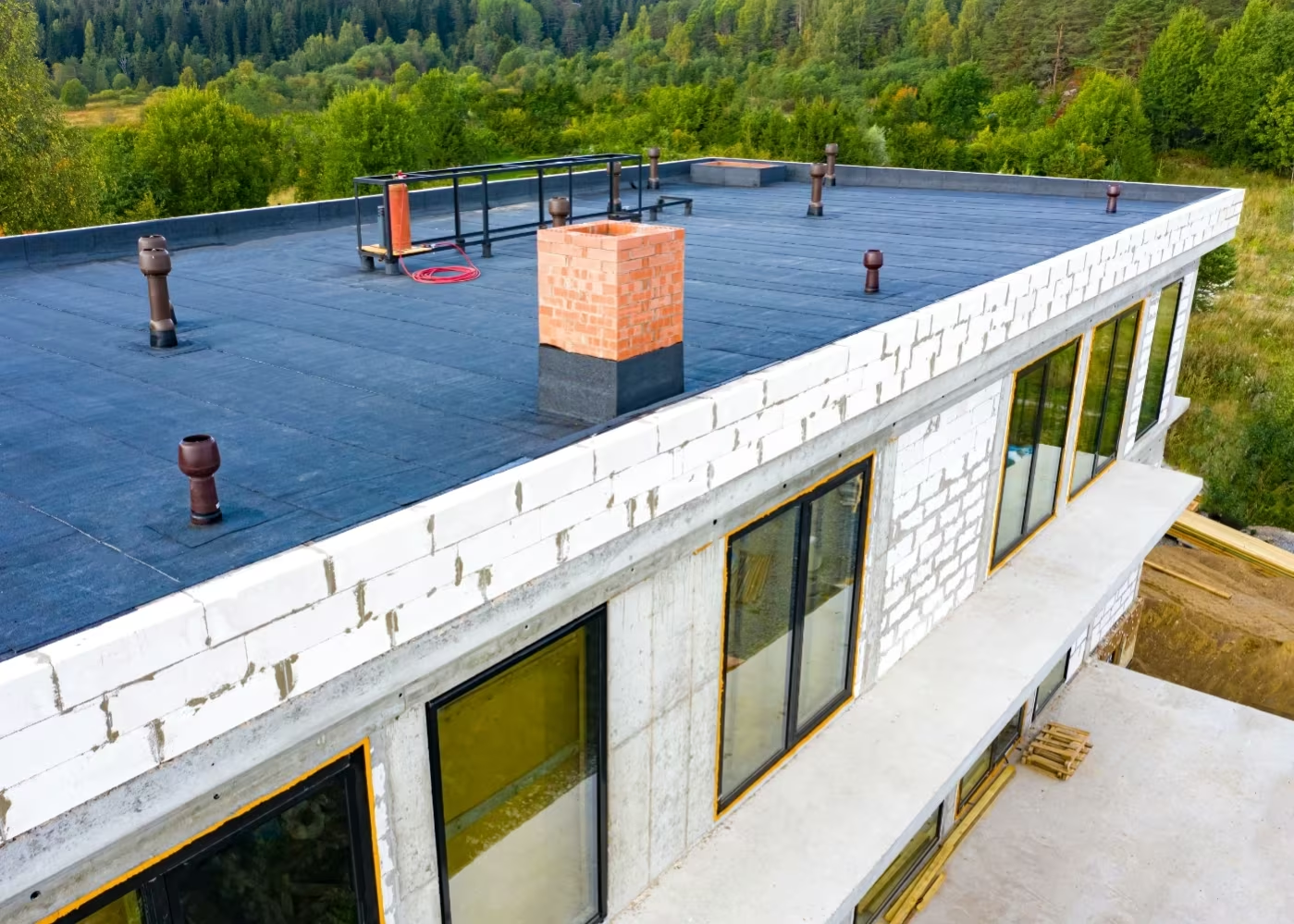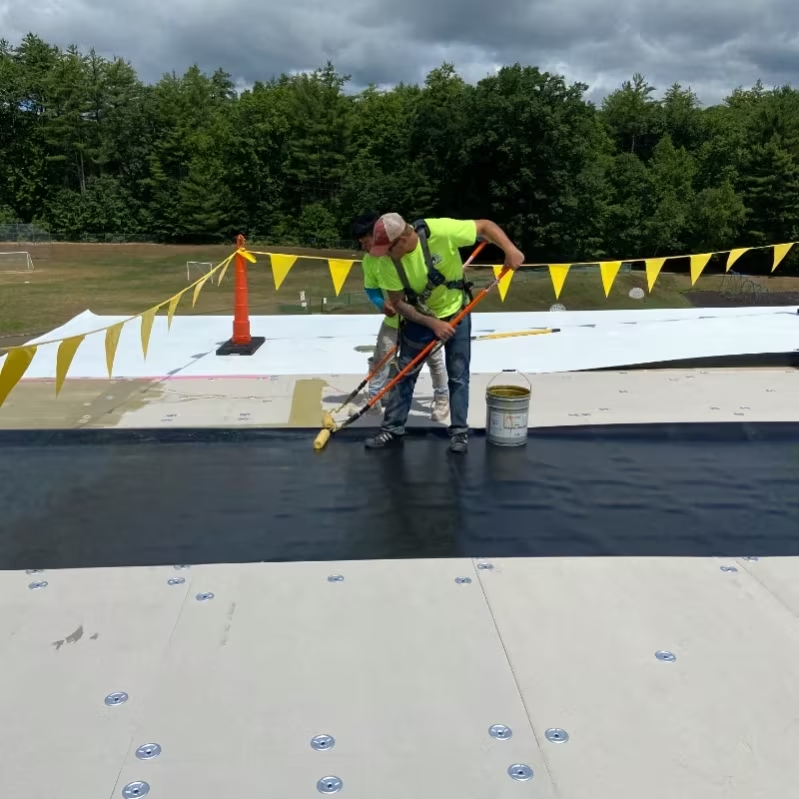Boston commercial roofing
For the best commercial roofing work in Boston, hire KTM Roofing & Exteriors. They know more than anyone else. Our dedicated team sets the bar for quality and dependability, making sure that your roofing needs are met with the best service possible.
Get a free estimate


Commercial roofing in our unique climate
Boston has very hot summers and very cold, snowy winters, so commercial roofing needs to be done in a planned way. KTM Roofing & Exteriors, a top commercial roofing company, knows this dynamic very well. Our team is an expert at choosing and putting on roofing materials for flat roofs that can handle Boston's unique weather. These materials are rubber EPDM (Ethylene Propylene Diene Terpolymer), TPO (Thermoplastic Polyolefin), and PVC (Polyvinyl Chloride). When we design our commercial roofing solutions to fit the unique problems that Boston's weather brings, we think about things like thermal expansion, moisture resistance, and roof drainage. When you get KTM for your commercial roofing, it's not just a building; it's an investment that will last.

Benefits of KTM Roofing & Exteriors professional roofing services
When you choose KTM Roofing & Exteriors, you're choosing a company that offers quality, expertise, and service that puts the needs of the customer first in the commercial Boston roofing industry. We take pride in using only the best materials for flat roofs and emergency roof repairs. This makes sure that your commercial roofing is not only strong but also looks good. From the first meeting to the last installation of your commercial roofing project, our team of certified commercial roofers is dedicated to providing the best service possible. At KTM, our top priority is making sure our customers are happy. We do everything we can to make sure that getting a new roof is easy and stress-free for you. When you hire KTM, you're not just getting a service; you're getting a roofing partner you can count on. KTM is supported by some of the best manufacturers in the business, and the company can offer extended warranties that cover both materials and labor directly from the manufacturer.
Recognizing the right time for commercial roofing services
For the safety of your business building, it's important to know when to call in professional roofers. At KTM Roofing & Exteriors, we help you find important signs of wear, like water stains, paint that is blistering, or flashing that is broken, which means you need professional Commercial Roof Repair. Following industry best practices, our team suggests regular roof maintenance, especially after bad weather, to make sure that problems are found early. You can trust KTM's knowledge to make your roof last longer, which will protect your investment and keep your building safe.

Commercial roof repair
Boston commercial roof repair
Commercial roof repair Boston
Commercial roof painting
Commercial roof installation
Commercial roof replacement
Commercial roof painting Boston
Commercial roof installation Boston
Commercial roof replacement Boston
Boston commercial roof painting
Boston commercial roof installation
Boston commercial roof replacement
Commercial roof maintenance
Commercial roof maintenance Boston
Boston commercial roof maintenance


KTM Roofing & Exteriors: Your premier commercial roofing expert
As Boston's best commercial roofing company, KTM Roofing & Exteriors brings a long history of high-quality work to every project. We are at the top of the industry because our team has a lot of experience with commercial roof installation and has worked on many successful projects. We are proud of how happy our customers are with our work, which shows how dedicated we are to quality. Clients trust KTM because we have certified professionals who make sure that every project meets the highest standards. For all your commercial roofing needs, go with KTM Roofing & Exteriors, where quality and expertise come together.
Latest roofing materials and technologies for your business
We at KTM Roofing & Exteriors are always on the cutting edge of roofing technology, using the newest materials and tools in our work. Our selection includes advanced options like eco-friendly materials that last a long time and energy-efficient membranes and shingles. All of these are meant to make your flat or shingled roof last longer and work better. We always keep up with the changing market, so we can offer your business roofing options that are not only up-to-date but also ready for the future. This way, your investment in a commercial roofing project will be safe for years to come.
Our commitment to quality and safety in roofing
At KTM Roofing & Exteriors, quality and safety are the most important things we do. In every commercial roofing project, our team follows strict safety rules to make sure that the work is done with the highest level of accuracy and care. We only use the best materials for replacing and maintaining roofs, and our workers are trained in the newest roofing methods. This dedication to quality means that every roofing job we do is not only beautiful but also strong and dependable.
Contact KTM Roofing & Exteriors for your commercial roofing needs
Want to make your commercial roofing experience in Boston even better? Get in touch with KTM Roofing & Exteriors right now for high-quality commercial roofing services! Our team is excited to talk about your specific needs. We offer a wide range of commercial roofing services, such as roof maintenance, repair, and installation. We make every step of the process easy and stress-free by being dedicated to customer service and making it easy to get in touch with us. Call us for a consultation, and let's work together to make your ideas for commercial roofing a reality. A simple call to KTM Roofing & Exteriors is the first step on your road to excellence.



Hear from our happy customers
Linda Weatherbee
Charles Pouliot
Robert Fortunato
Raymond Madore
Contact us
Contact us today and take the first step towards enhancing your home or business in Boston, or surrounding areas!